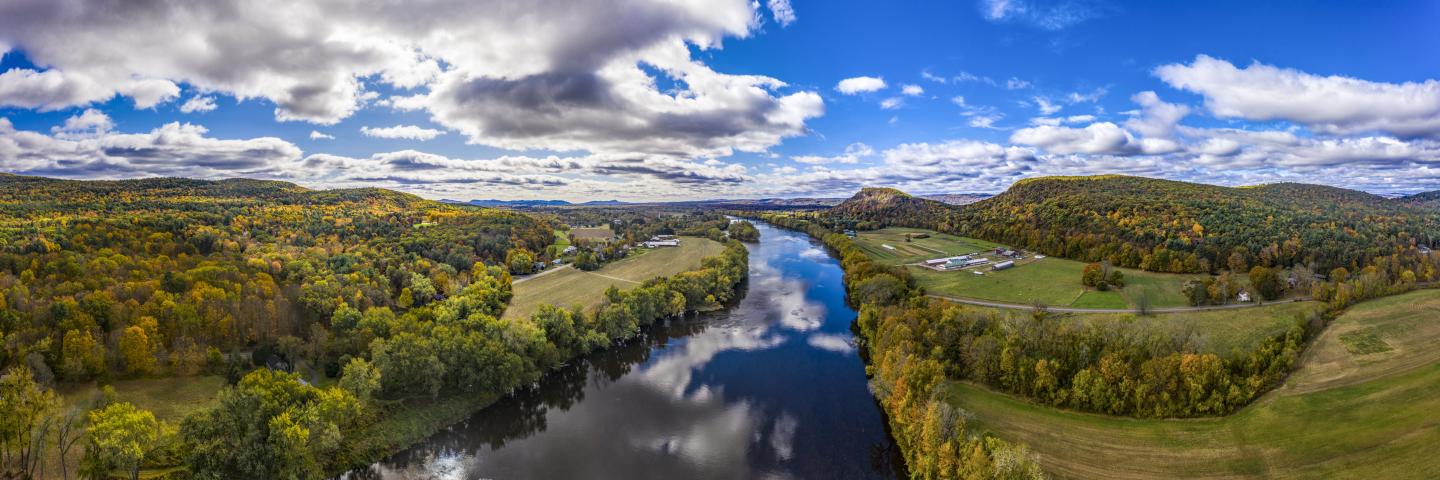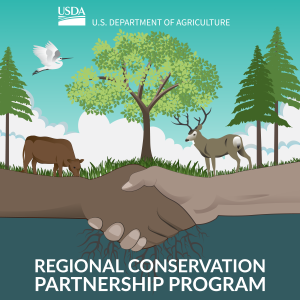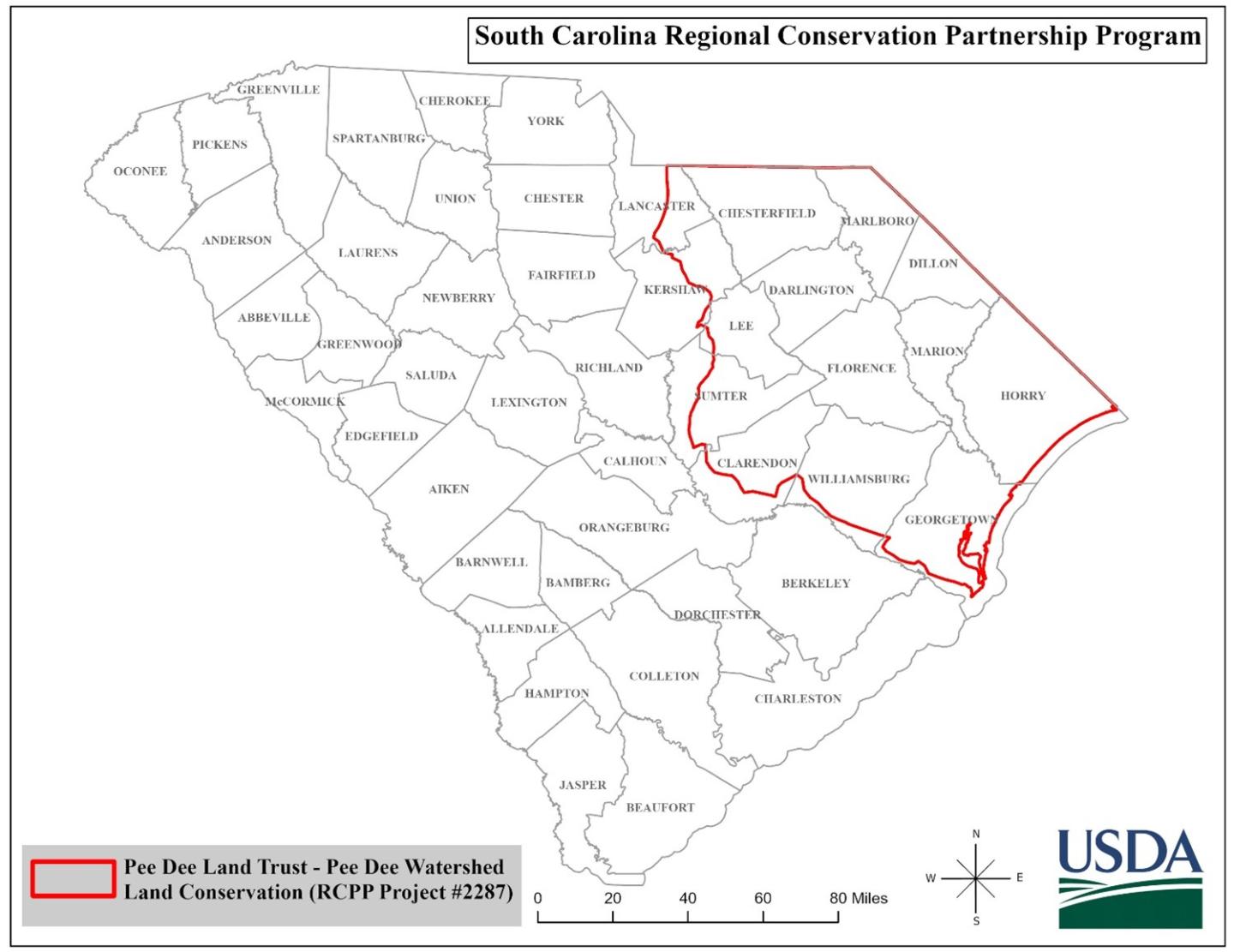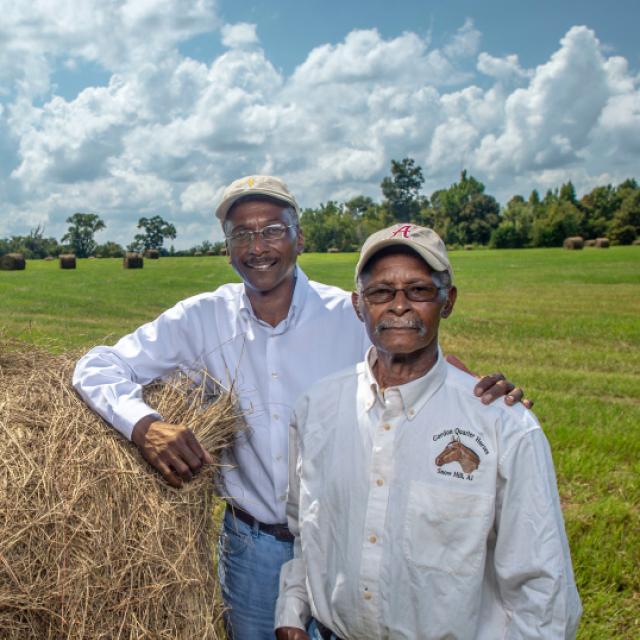
The Regional Conservation Partnership Program (RCPP) is a partner-driven approach to conservation that funds solutions to natural resource challenges on agricultural land.
About the Regional Conservation Partnership Program (RCPP)

By leveraging collective resources and collaborating on common goals, RCPP demonstrates the power of public-private partnerships in delivering results for agriculture and conservation.
RCPP projects fall under two different categories: RCPP Classic and RCPP Alternative Funding Arrangements (AFAs).
RCPP Classic projects are implemented using NRCS contracts and easements with producers, landowners and communities, in collaboration with project partners.
Through RCPP AFAs, NRCS provides funding to partners to support conservation activities with eligible producers and landowners on eligible land. RCPP AFA funding reimburses partners for conservation activities done for or on behalf of producers, landowners, or other entities.
RCPP Partners and Impact
1. Impact—RCPP applications must propose effective and compelling solutions that address one or more natural resource priorities to help solve natural resource challenges. Partners are responsible for evaluating a project’s impact and results.
2. Partner Contributions—Partners are responsible for identifying any combination of cash and in-kind value-added contributions to leverage NRCS’s RCPP investments. It is NRCS’s goal that partner contributions at least equal the NRCS investment in an RCPP project. Substantive partner contributions are given priority consideration as part of the RCPP application evaluation criteria.
3. Partnerships and Management—Partners must have experience, expertise, and capacity to manage the partnership and project, provide outreach to producers, and quantify the environmental outcomes of an RCPP project. RCPP ranking criteria give preference to applicants that meaningfully engage historically underserved farmers and ranchers.
RCPP Conservation Activities
RCPP projects may include a range of on-the-ground conservation activities implemented by farmers, ranchers and forest landowners. These activities include:
- Land management/land improvement/restoration practices
- Land rentals
- Entity-held easements
- United States-held easements
- Public works/watersheds
A single RCPP project application can propose to employ any combination of these eligible activity types as part of an RCPP project.
For more information on RCPP easements, visit the RCPP easement page.
Who is Eligible
Partner Eligibility
Eligible organizations interested in partnering with NRCS on conservation projects can develop applications for the RCPP competition. The lead partner for an RCPP project is the entity that submits an application, and if selected for an award is ultimately responsible for collaborating with NRCS to successfully complete an RCPP project.
See the RCPP funding announcement for details about what types of organizations are eligible to apply.
Producer and Landowner Eligibility
Once NRCS selects a project and executes an RCPP agreement with a lead partner, agricultural producers may participate in an RCPP project in one of two ways. First, producers may engage with project partners and delegate a willing partner to act as their representative in working with NRCS. Second, producers seeking to carry out conservation activities consistent with a RCPP project in the project’s geographic area can apply directly to NRCS.
Land Eligibility
RCPP projects must be carried out on agricultural or nonindustrial private forest land or associated land on which NRCS determines an eligible activity would help achieve conservation benefits (i.e., improved condition of natural resources resulting from implementation of conservation activities).
Eligible conservation activities may be implemented on public lands when those activities will benefit eligible lands as determined by NRCS and are included in the scope of an approved RCPP project.
NEW!
Agricultural Landowners Encouraged to Protect Land Through the Pee Dee Watershed Land Conservation Project
Application Period Open for Ongoing Regional Conservation Partnership Program Project
Application Deadline: June 30, 2025
Columbia, South Carolina – May 2025 – The U.S. Department of Agriculture’s (USDA) Natural Resources Conservation Service (NRCS) encourages landowners in the Pee Dee region to consider participating in the Pee Dee Watershed Land Conservation project, an active initiative under the Regional Conservation Partnership Program (RCPP).
Led by the Pee Dee Land Trust (PDLT), this project focuses on permanently protecting high-conservation-value farm and forest lands throughout the Pee Dee Watershed through entity-held conservation easements. The project aims to enhance water quality, preserve working lands, and create connected greenways and blueways in a region increasingly threatened by land fragmentation and development.
PROJECT FOCUS: Pee Dee Watershed Land Conservation (RCPP Project #2287)
PDLT anticipates conserving between 2,500 and 3,000+ acres of land during the life of the project. With the support of NRCS and partner contributions, the project provides funding to assist landowners with the cost of placing a conservation easement on their property, allowing them to preserve the integrity and productivity of their land for future generations.
The Pee Dee Watershed spans key areas of northeastern South Carolina, including Horry, Dillon, Marion, Marlboro, Chesterfield, Darlington, Florence, Georgetown, Williamsburg, Clarendon, Sumter, Lee, Kershaw and Lancaster counties. The project emphasizes protection of land along waterways to improve water quality and mitigate flooding risks.

APPLICATION REQUIREMENTS:
• Farm records must be established or updated with the Farm Service Agency (FSA) for the applicant and the land.
• Applicants must be in compliance with highly erodible land and wetland conservation requirements.
• Documentation for signature authority and proof of ownership.
For more details and information or to apply, contact PEE DEE LAND TRUST.
PEE DEE LAND TRUST CONTACTS:
• Pee Dee Land Trust: Seth Cook – landprotection@peedeelandtrust.org
• Pee Dee Land Trust: Lyles Cooper – lclyles@peedeelandtrust.org
SOUTH CAROLINA RCPP CONTACTS:
• Pedro Cruz-Carballo, RCPP Coordinator, pedro.cruzcarballo@usda.gov
• Reginald Hall, ASTC-Programs, reginald.hall@usda.gov
USDA is an equal opportunity provider, employer, and lender.
Ready to get started?
Contact your local service center to start your application.
How to Get Assistance
Do you farm or ranch and want to make improvements to the land that you own or lease?
Natural Resources Conservation Service offers technical and financial assistance to help farmers, ranchers and forest landowners.

To get started with NRCS, we recommend you stop by your local NRCS field office. We’ll discuss your vision for your land.
NRCS provides landowners with free technical assistance, or advice, for their land. Common technical assistance includes: resource assessment, practice design and resource monitoring. Your conservation planner will help you determine if financial assistance is right for you.
We’ll walk you through the application process. To get started on applying for financial assistance, we’ll work with you:
- To fill out an AD 1026, which ensures a conservation plan is in place before lands with highly erodible soils are farmed. It also ensures that identified wetland areas are protected.
- To meet other eligibility certifications.
Once complete, we’ll work with you on the application, or CPA 1200.
Applications for most programs are accepted on a continuous basis, but they’re considered for funding in different ranking periods. Be sure to ask your local NRCS district conservationist about the deadline for the ranking period to ensure you turn in your application in time.
As part of the application process, we’ll check to see if you are eligible. To do this, you’ll need to bring:
- An official tax ID (Social Security number or an employer ID)
- A property deed or lease agreement to show you have control of the property; and
- A farm number.
If you don’t have a farm number, you can get one from USDA’s Farm Service Agency. Typically, the local FSA office is located in the same building as the local NRCS office. You only need a farm number if you’re interested in financial assistance.
NRCS will take a look at the applications and rank them according to local resource concerns, the amount of conservation benefits the work will provide and the needs of applicants. View Application Ranking Dates by State.
If you’re selected, you can choose whether to sign the contract for the work to be done.
Once you sign the contract, you’ll be provided standards and specifications for completing the practice or practices, and then you will have a specified amount of time to implement. Once the work is implemented and inspected, you’ll be paid the rate of compensation for the work if it meets NRCS standards and specifications.

